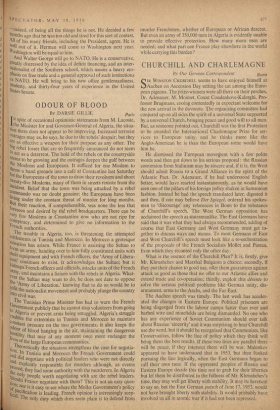ODOUR OF BLOOD
By DARSIE GIME 1N spite of occasional optimistic statements from M. Lacoste, , the Minister for and Governor-General of Algeria, the shun- lull there does not appear to be improving. Increased terrorist nutrages may as. he says, be due to the rebels' despair; but they re as effective a weapon for their purpose as any other. The mg rebel losses that are so frequently announced do not seem tc) net as a deterrent. The hold of the rebels on the countryside seems to be growing and the outrages deepen the gulf between thC Moslems and Europeans. It sufficed for one Moslem to throw a hand grenade into a café at Constantine last Saturday for the Europeans of the town to draw their revolvers and shoot ,IWenty-tive Moslems, many of them in streets remote from the Incident. Belief that the town was being attacked by a rebel ieftmando was no doubt genuine; the Europeans have been ving under the constant threat of murder for king months. 13, ut their reaction, if comprehensible, was none the less that loreseen and desired by thd rebel headquarters. There can be verY few Moslems in Constantine now who are not ripe for ei°,11spiracy, and determined to give no information to the Tench authorities. The trouble in Algeria, too, is threatening the attempted seulements in Tunisia and Morocco. In Morocco a grotesque uation has arisen. While France is assisting the Sultan to I VI.11 an army, handing over to him fully constituted units with 1;1.1eIr equipment and with French officers, the 'Army of Libera- 1,11911' continues to exist. It acknowledges the Sultan; but it "Idnaps French officers and officials, attacks units of the French 414, and maintains a liaison with the rebels in Algeria. What- e.,ver the Sultan may want to do, he does not dare to oppose 'Army of Liberation,' knowing that to do so would be to Pit the nationalist movement and probably plunge the country civil war. ct, The Tunisian Prime Minister has had to warn the French °vernment publicly that he cannot stop volunteers from going Algeria or prevent arms being smuggled. Algeria's struggle enables the extremists in Tunisia and Morocco to maintain '(eNstant pressure on the two governments; it also keeps the Lclattr of blood hanging in the air, maintaining the dangerous ni,ostility that may at any moment once more endanger the 'Ives of the large European communities. ti Theoretically the situation strengthens the case for negotia- ,_". In Tunisia and Morocco the French Government could "Icl did negotiate with political leaders who were not directly explicitly responsible for murders although, as events pri'ved, they had some authority with the murderers. In Algeria tstle only people worth negotiating with are the rebel leaders. ti lould France negotiate with them? This is not an easy ques- 0,911: nor is it easy to see where the Mollet Government's policy Pacification is leading. French opinion is increasingly seep- The only duty which does seem plain is to defend from murder Frenchmen, whether of European or African descent. But even an army of 350.000 men in Algeria is evidently unable to provide effective protection. How many more men are needed; and what part can France play elsewhere in the world while carrying this burden?


































 Previous page
Previous page